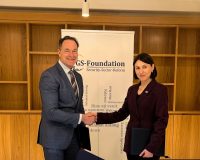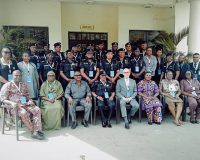With a joint workshop in Chișinău, the GS-Foundation and the Moldovan Ministry of Internal Affairs (MIA) have officially launched a groundbreaking project. The goal: to gather, consolidate and expand the Moldovan drone expertise of all institutions, with the possibility of establishing a drone competence centre in the future, subject to a political decision. This initiative, funded by the German Federal Foreign Office, aims to modernize Moldova’s civil security institutions and support the country’s path toward EU integration.
A Milestone for Interagency Cooperation
Earlier this month, a milestone was reached in the Moldovan capital: for the first time, all departments of the Ministry of Internal Affairs gathered to jointly discuss the use of drones in civil security – from operational status and training standards to legal frameworks and strategic priorities.
Strategic Vision: From Dialogue to Development
The launch workshop marked the beginning of the Drone Competence MDA project, implemented by the GS-Foundation and funded by the German Federal Foreign Office. The initiative focuses on strengthening the Moldovan MIA’s internal capacities and developing a cohesive strategy for drone use and training across all civilian security authorities.
“The workshop was an essential step toward defining a common strategic vision for the use of drones, providing a valuable framework for dialogue between MIA structures and our partners.”
— General Police Inspectorate, Republic of Moldova
The GS-Foundation’s Project Lead, Klaus Kandt, emphasized the significance of the dialogue:
“It was the first time all relevant MIA institutions came together to assess the current status of drone deployment and jointly reflect on the path forward – including training, procurement standards, and legal responsibilities.”
Laying the Foundation for a National Strategy
Beyond technical aspects, the project aims to lay the groundwork for a national strategy, with ripple effects that could influence security governance across Moldova’s public sector. A key focus lies in building long-term institutional capacities – from establishing minimum standards for drone training and operations, to developing a uniform curriculum at the police academy and training the trainers for both basic and advanced drone courses.
Ultimately, the initiative contributes to Moldova’s broader efforts to modernize its internal security structures and align with European standards, especially in the face of geopolitical uncertainty and growing demands on civil protection.







